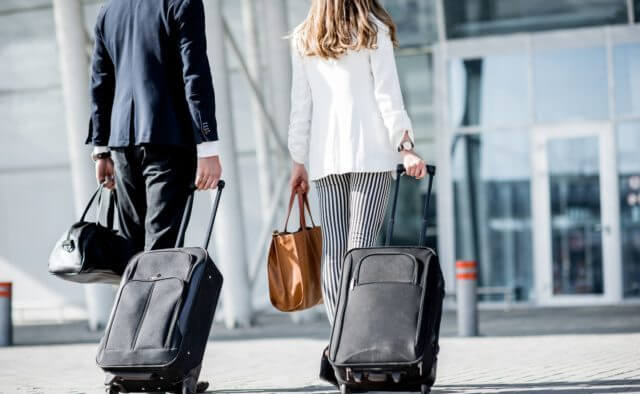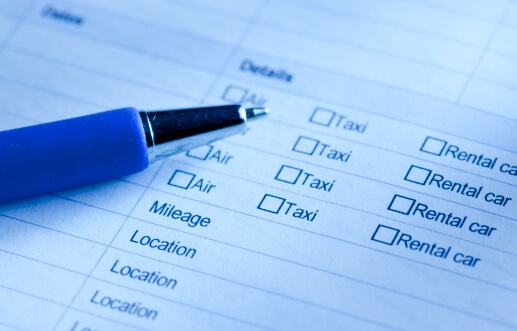Para cualquier empresa, grande o pequeña, es necesario realizar un seguimiento de los gastos comerciales para comprender el «panorama general» de la situación financiera de la empresa. Tener un excelente control sobre el seguimiento de los gastos empresariales significa que el propietario de la empresa siempre sabe cuánto dinero sale, cuánto entra y cuántos impuestos hay que pagar al final del año fiscal. Este artículo explicará qué son exactamente los gastos de viaje y cuál es la mejor solución manos libres para registrar todas las deducciones fiscales de tus viajes de negocios.
Nota: Si desea realizar un seguimiento y organizar automáticamente sus gastos de viaje, pruebe Bonsai Tax. Nuestro software ahorra a los usuarios una media de 5600 dólares en sus impuestos. Solicite aquí su prueba gratuita de 14 días aquí.
El seguimiento de los gastos de viaje en los viajes de negocios no es el punto fuerte de los autónomos.
Los «gastos de viaje» son una categoría de deducción empresarial que, dependiendo de la naturaleza del negocio, puede suponer una suma considerable y, por lo tanto, puede dar lugar a una importante desgravación fiscal (me vienen a la mentelos conductoresde Uber, Lyft e Instacart, y los contratistas independientes de GrubHub, pero también se aplica a muchos otros tipos de autónomos).
Mientras que muchas grandes empresas contratan contables para estar al tanto de estas cuestiones, los contratistas independientes, autónomos y otros trabajadores por cuenta propia 1099 deben llevar ellos mismos un control de sus gastos de viaje (y de cualquier otro tipo), lo que les causa ansiedad y confusión.
La ansiedad proviene de tener que mantener un proceso bastante engorroso y que requiere mucho tiempo, como registrar los recibos, organizar las diferentes categorías de gastos y prestar atención constante a un montón de «papeleo». La confusión surge porque no siempre se entiende cómo desglosar con precisión todas las diferentes categorías de gastos: ¿qué es un «gasto de viaje» y cómo se puede empezar a llevar un registro, organizar y calcular estos gastos como deducciones en la declaración de impuestos?

La solución sencilla para contratistas
Como resultado, muchos autónomos preferirían caminar descalzos sobre cristales rotos antes que llevar un meticuloso control de sus registros y presupuestos... Y, sin embargo, si no lo hacen, acaban perdiendo dinero que podrían haber gastado en el negocio (¡o en ellos mismos!).
Afortunadamente, ahora existen aplicaciones para el seguimiento de gastos que pueden tomar todo ese molesto «papeleo» y simplificarlo en un proceso digital rápido y fácil que no te hará explotar la cabeza.
La aplicación Bonsai Tax expense tracker te permite importar, escanear, clasificar, realizar un seguimiento y almacenar los gastos de tu negocio, incluidos los gastos de viaje, en una cuenta online basada en la nube a la que puedes acceder desde cualquier lugar. Realiza un seguimiento de tus ingresos y gastos, emitiendo informes de gastos y estimaciones de la declaración de la renta en tiempo real, para que nada se «acumule» hasta el punto de que solo quieras marcharte lejos de todo...
Veamos más de cerca por qué el software/aplicación Bonsai para el seguimiento de gastos de viaje es tan popular entre los autónomos.
El seguimiento de gastos es esencial para los autónomos
En general, es necesario que cualquier trabajador autónomo realice un seguimiento de todos los registros financieros y conserve los registros durante tres años. Esto se aplica tanto a los autónomos que trabajan por cuenta propia como a las grandes corporaciones. Saber cuánto dinero ingresa y cuánto sale tiene un efecto en todos los aspectos de su empresa: desde calcular el «rendimiento de la inversión» hasta saber cuánto deberá pagar en impuestos al final del año, pasando por poder amortizar algunos de estos costes como deducciones, lo que le permitirá ahorrar dinero.
Si tienes algún gasto empresarial, no es realista pensar que puedes simplemente guardar estos números en tu cabeza y seguir teniendo una idea precisa del flujo de caja. Necesitas saber cómo funciona tu negocio desde el punto de vista financiero. Nos guste o no, dirigir un negocio implica elaborar presupuestos, es decir, manejar números.
Por lo tanto, tu reto como autónomo de éxito no es cómo evitar el seguimiento de las deducciones fiscales, sino cómo realizar un seguimiento de los gastos empresariales de la forma más eficiente y sencilla posible con la mejor herramienta de gestión financiera, y ahí es donde un software de seguimiento de gastos fiscales como Bonsai Tax puede marcar *toda* la diferencia.

¿Quién necesita un gestor de gastos de viaje?
Si usted es un trabajador autónomo que viaja o conduce exclusivamente por motivos de trabajo al menos parte del tiempo, debe llevar un registro de sus gastos de viaje (entre otras categorías de gastos comerciales), en el que anote los gastos de forma continua. Hacer esto ayuda de varias maneras:
- Proporcionar una imagen real del gasto, con cifras que se pueden representar gráficamente. Esto puede ayudarte a comprender mejor el desglose de los gastos de la empresa.
- Lleve un registro de todos los recibos para deducciones fiscales, ya que algunos gastos de viajes de negocios son, de hecho, deducibles en el Anexo C (Anexo F si es agricultor), Formulario 1040, de su declaración de impuestos (¡y esto le ahorra dinero!).
- Evite los atascos de última hora y las desagradables «sorpresas» a la hora de presentar la declaración de impuestos.
Con la aplicación Bonsai Tax, tu principal responsabilidad es recordar escanear tus recibos físicos de efectivo en el software de seguimiento de gastos, así como mantener una vigilancia general sobre el seguimiento de los gastos y la contabilidad de los recibos. El software se encarga del resto: desde importar los extractos de tu tarjeta de crédito y cuenta bancaria hasta clasificar los diferentes gastos según su potencial deducible, pasando por rellenar la mayor parte de tu declaración de impuestos con los gastos deducibles preclasificados en los gráficos adecuados para su deducción. No es de extrañar que se considere la mejor aplicación de recibos.

¿Qué compras se consideran «gastos de viaje»?
El Servicio de Impuestos Internos (IRS) define los gastos de viaje de negocios que pueden deducirse de los impuestos como: «los gastos ordinarios y necesarios de viajar fuera de casa por motivos de negocios, profesión o trabajo», y ofrece la siguiente descripción: «Se considera que viaja fuera de su domicilio si sus obligaciones le obligan a estar fuera de la zona general de su domicilio fiscal durante un período considerablemente más largo que una jornada laboral normal, y necesita dormir o descansar para poder cumplir con las exigencias de su trabajo mientras está fuera».
Lo que el IRS define como «domicilio fiscal» es «toda la ciudad o zona general donde se encuentra su lugar principal de negocio o trabajo, independientemente de dónde tenga su domicilio familiar».

Gastos comunes de viaje
Teniendo en cuenta que el IRS no aceptará gastos de viaje que considere «ostentosos o extravagantes», los gastos de viaje más frecuentemente deducidos cuando se está fuera de casa incluyen los siguientes costes.
Nota: Si desea una aplicación que identifique automáticamente todos sus gastos de viaje a partir de sus extractos bancarios o tarjetas de crédito, pruebe Bonsai Tax. Nuestro software escanea y organiza todos tus recibos para encontrar deducciones fiscales que puedas reclamar al final del año. Los usuarios suelen ahorrar 5600 dólares. Prueba una prueba gratuita aquí ahora.
- Viajar en tren, autobús, avión o coche entre el domicilio y el lugar de trabajo.
- Transporte público/tarifa de taxi entre: el aeropuerto/estación de tren/estación de autobuses y el lugar de alojamiento o el hotel y la ubicación del cliente/reunión de negocios/lugar de trabajo temporal.
- Alojamiento
- Comidas no relacionadas con el entretenimiento (las deducciones se pueden calcular utilizando la «asignación estándar para comidas» establecida por el IRS; las deducciones por comidas de negocios suelen limitarse al 50 % del coste no reembolsado de la comida).
- Envío de equipaje/materiales de muestra entre la oficina habitual y los lugares de trabajo temporales.
- Llamadas de negocios realizadas durante el viaje de negocios (incluye fax)
- Utilizar el coche propio o alquilado en el destino de negocios (se puede utilizar el método de «tarifa por kilómetro estándar» o el de «gastos reales» para deducir los gastos del coche, junto con los peajes y las tarifas de aparcamiento relacionados con el negocio).
- Propinas pagadas por cualquiera de los servicios anteriores.
- Gastos de entretenimiento
Además, los autónomos que utilizan su propio coche (o uno alquilado) con fines comerciales, incluso dentro del territorio de su «domicilio fiscal», pueden deducir algunos de los gastos relacionados con el coche (utilizando los métodos de deducción mencionados anteriormente, «tarifa estándar por kilómetro» o «gastos reales»), en los siguientes casos:
- conducir para reunirse con un cliente o conducir entre varias reuniones con clientes
- conducir hasta la tienda exclusivamente para comprar material de oficina
- desplazamientos entre varios lugares de trabajo (no incluye los «kilómetros de desplazamiento» desde/hacia el domicilio)
- conducir a una convención profesional, siempre y cuando la participación en ella beneficie al negocio.
- Conducir a una reunión con un consultor profesional (como un abogado o un gestor financiero) que asesora o presta servicios a la empresa.
A continuación se indican algunas de las diferencias clave entre los métodos de deducción de gastos reales y de deducción por kilometraje estándar (recuerde que son mutuamente excluyentes).

La deducción de gastos reales
La deducción de los gastos reales del vehículo es el método tradicional de deducción fiscal basado en recibos detallados, que exige al empresario conservar todos los recibos pertinentes de los gastos relacionados con el trabajo, como gasolina, mantenimiento, reparación, seguro, título de propiedad, licencia, matriculación, depreciación y otros costes. El autónomo también tiene que calcular el porcentaje de uso comercial de su coche.
Para calcular los gastos reales del año, tome el valor total de todos los gastos de su automóvil y multiplíquelo por el porcentaje de «uso comercial» del vehículo.
Por supuesto, con la aplicación organizadora de recibos de viaje Bonsai Tax, los cálculos están garantizados. Todo lo que tienes que hacer es recordar introducir los gastos relacionados con el coche que no aparecen en tu tarjeta de crédito o cuenta bancaria en la aplicación de seguimiento de gastos, así como proporcionar el porcentaje estimado de uso comercial del coche: el resto lo gestiona la aplicación de seguimiento de deducciones fiscales.

La deducción estándar por kilometraje
En el pasado, antes de que aplicaciones útiles como Bonsai Tax estuvieran disponibles para el consumidor, el método de «gastos reales» mencionado anteriormente, con su extenso registro detallado, se consideraba bastante engorroso e intimidante para el propietario medio de una pequeña empresa, por lo que el IRS ideó el enfoque estándar de reembolso por kilometraje para simplificar la experiencia de deducir los «kilómetros de negocios» en un vehículo personal.
Con el método de kilometraje estándar, el propietario de la empresa lleva un registro de todos los kilómetros recorridos por motivos de trabajo. Para calcular la deducción, sume todas las millas comerciales que cumplan los requisitos y multiplíquelas por la tarifa por milla establecida por el IRS (en 2021, la tarifa estándar por milla es de 0,56 dólares por milla).
Como habrás adivinado, el gestor de gastos Bonsai Tax también se encarga de estos cálculos, además de rellenar automáticamente los formularios fiscales digitales correspondientes cuando llega el momento de presentar la declaración de la renta.
La diferencia de la aplicación Bonsai Travel Expense Tracker
Hacer un seguimiento de tus gastos de viaje a través de la aplicación Bonsai Tax no solo te ayudará con las deducciones futuras (¡lo cual ya es muy importante!), sino que también te mostrará cuáles son tus gastos de viaje y te ayudará a presupuestar mejor tus futuros viajes de negocios. El uso de nuestra aplicación te ayudará a evitar el uso de una plantilla de seguimiento de gastos.
Estas son solo algunas de las útiles funciones que encontrarás en el controlador de gastos de Bonsai:
- Ayuda a gestionar las facturas y el presupuesto en tiempo real, en aplicaciones web y móviles (Android e iOS).
- Importa automáticamente los gastos de todas las tarjetas de crédito y cuentas bancarias conectadas.
- Incluye un escáner de recibos para consolidar, rastrear y organizar tus recibos de gastos en efectivo en una cuenta digital basada en la nube (no dudes en reciclar las copias impresas después de escanearlas, para mantener tu archivo ordenado).
- Añade fácilmente gastos a tus proyectos y facturas.
- Admite gastos en múltiples divisas, con tipos de cambio en tiempo real (las divisas son importantes para los viajeros con gastos de viajes de negocios internacionales).
- Analiza tus gastos y emite estimaciones trimestrales de cuánto tendrás que pagar en impuestos durante el año (¡adiós a las «sorpresas» desagradables!).
- Facilita la creación de informes de gastos para ayudarte a controlar tu presupuesto.
A diferencia de otros programas para controlar los gastos de viaje, la aplicación Bonsai Tax no requiere descarga alguna: funciona en tu ordenador o teléfono (Android/iOS) con solo una conexión a Internet.
Si ya disfrutas de una suscripción «Workflow» o «Workflow Plus» con el paquete de productos todo en uno de Bonsai para autónomos 1099 (contratos, propuestas, CRM de clientes, seguimiento de tiempo/tareas, facturas, formularios, etc.), puedes registrarte para obtener una prueba gratuita de Bonsai Tax.
¡Experimente por sí mismo la funcionalidad, la productividad y la tranquilidad que le ofrece la mejor aplicación para controlar los gastos de viaje!






